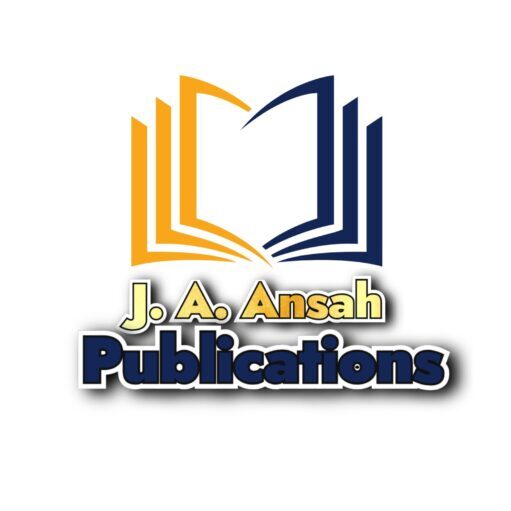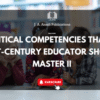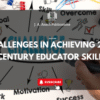THE ESSENTIAL SKILLS OF A 21ST-CENTURY EDUCATOR

In an era defined by rapid technological developments and everchanging societal needs, the role of educators has advanced far beyond traditional teaching. The 21st-century educator is tasked with preparing students not only for academic success but also for thriving in a dynamic, interconnected world. To achieve this, educators must possess a unique set of skills that blend pedagogy, technology, emotional intelligence and adaptability. Let’s explores the essential skills of a 21st-century educator, supported by relevant academic insights and practical examples.
Digital Literacy
The infusion of technology into every aspect of life demands that educators are proficient in digital tools and platforms. From interactive whiteboards and virtual classrooms to learning management systems and artificial intelligence-driven tools, digital literacy enables teachers to engage students more effectively. Research underscores the importance of digital competence in teaching. According to Voogt et al. (2013), educators who integrate technology into their instruction enhance student engagement and foster deeper learning. Furthermore, tools such as Kahoot, Google Classroom and Zoom have become indispensable in modern classrooms, particularly post-COVID-19.
Lifelong Learning
The ever-evolving educational landscape demands that teachers continuously upgrade their knowledge and skills. Lifelong learning is a value that educators should stir in students and also a practice they must embody. This outlook allows educators to remain current with new pedagogical theories, technological trends and curricular changes. Ertmer and Ottenbreit-Leftwich (2010) highlight that ongoing professional development programmes are critical in equipping teachers with contemporary strategies, especially when adapting to the challenges of blended or hybrid learning models. Principle
Emotional Intelligence and Empathy
Emotional intelligence (EI) is a cornerstone of effective teaching. Educators with high EI can appreciate and respond to students’ emotional and psychological needs, creating a supportive and inclusive learning environment. Empathy helps teachers connect with students from diverse backgrounds, nurturing shared respect and understanding. As Goleman (1995) suggests, emotional intelligence boosts classroom management and student-teacher relationships, leading to improved academic outcomes and reduced behavioural issues. Programmes like restorative practices and socio-emotional learning (SEL) initiatives rely heavily on the emotional skills of educators.
Critical Thinking and Problem-Solving
In the age of misinformation, disinformation and intricate global challenges, the ability to think critically is more crucial than ever. Educators must model and teach critical thinking skills to their students while employing these skills to evaluate resources, innovate instructional methods, and solve pedagogical problems. Brookfield (2012) argues that critical thinking enables educators to challenge traditional practices and adopt evidence-based teaching strategies that resonate with contemporary learners.
Cultural Competence
Globalisation and growing cultural diversity necessitate that educators are culturally competent. This skill involves understanding, respecting and valuing different cultural perspectives while incorporating them into the learning environment. Ladson-Billings (1995) introduces the concept of culturally relevant pedagogy, emphasising that teachers who acknowledge and integrate students’ cultural backgrounds into their teaching foster higher engagement and achievement.
Collaboration and Teamwork
Educators must collaborate with colleagues, parents and community stakeholders to create an all-inclusive learning environment. Effective teamwork ensures that diverse perspectives are considered, resulting in more comprehensive educational strategies. Hargreaves and Fullan (2012) stress the importance of professional learning communities (PLCs) in fostering collaboration among educators. PLCs allow teachers to share experiences, resources and strategies, promoting a culture of continuous improvement.
Creativity and Innovation
The aptitude to think creatively and introduce innovative teaching methods is a mark of a 21st-century educator. Whether through project-based learning, gamification or the incorporation of virtual reality, innovative approaches make learning more engaging and relevant. Robinson (2011) highlights the importance of creativity in education, advocating for an educational model that nurtures individual talents and fosters out-of-the-box thinking.
Adaptability and Resilience
The unpredictability of the modern world requires educators who can adapt to change and bounce back from setbacks. Whether it is shifting to remote teaching during a pandemic or addressing the evolving needs of students, adaptability ensures that teachers remain effective under any circumstances. Darling-Hammond (2017) emphasises that resilience in educators is crucial for maintaining motivation and delivering quality education despite challenges.
Conclusion
The 21st-century educator is a dynamic professional equipped with a blend of digital literacy, emotional intelligence, creativity and cultural competence. As the demands of education continue to change, so too must the skills and methods of those at the forefront of teaching. By embodying these skills, educators can empower students to navigate and succeed in an ever-changing world.
REFERENCES
Brookfield, S. D. (2012). Teaching for critical thinking: Tools and techniques to help students question their assumptions. Jossey-Bass.
Darling-Hammond, L. (2017). Empowered educators: How high-performing systems shape teaching quality around the world. Jossey-Bass.
Ertmer, P. A., & Ottenbreit-Leftwich, A. T. (2010). Teacher technology change: How knowledge, confidence, beliefs, and culture intersect. Journal of Research on Technology in Education, 42(3), 255–284.
Goleman, D. (1995). Emotional Intelligence: Why it can matter more than IQ. Bantam Books.
Hargreaves, A., & Fullan, M. (2012). Professional capital: Transforming teaching in every school. Teachers College Press.
Ladson-Billings, G. (1995). Toward a theory of culturally relevant pedagogy. American Educational Research Journal, 32(3), 465–491.
Robinson, K. (2011). Out of Our Minds: Learning to Be Creative. Capstone Publishing.
Voogt, J., Erstad, O., Dede, C., & Mishra, P. (2013). Challenges to learning and schooling in the digital networked world of the 21st century. Journal of Computer Assisted Learning, 29(5), 403–413.


